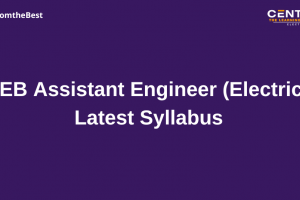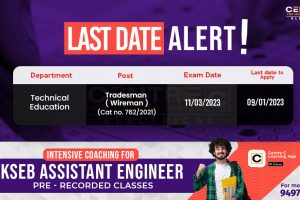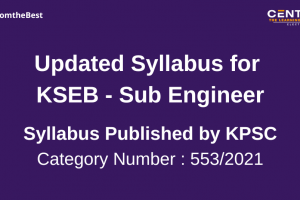
SSC Junior Engineer (Electrical) – New Syllabus
SSC Junior Engineer (Electrical) – New Syllabus
CENTRE-C ELECTRICAL
Staff Selection Commission will hold an open competitive Examination for recruitment of Junior Engineers ( Electrical ) for various Ministries/Departments/Organizations in the Government of India. The posts are Group ‘B’ (Non-Gazetted), in Level-6 (Rs 35400-112400/-) of pay matrix of 7th Central Pay Commission. The standard of the questions in Engineering subjects will be approximately of the level of Diploma in Engineering ( Electrical ). The details of the syllabus are given below:
Scheme of Examination:
The Examination will consist of two Papers; i.e. Paper-I (Computer Based Examination) and Paper-II (Descriptive). Details of these Papers are as follows:
| Papers | Mode of Examination | Subject | No of Questions/ Max. Marks | Duration |
| Paper-I | Computer Based Examination | (i) General Intelligence and Reasoning (ii) General Awareness (iii) Part-B: General Engineering (Electrical) | (i) 50/50 (ii) 50/50 (iii) 100/ 100 | 2 Hours (2 hours and 40 minutes for the candidates who are eligible for scribe as per Para-10.1 and 10.2) |
| Paper-II | Written Examination | Part-B: General Engineering (Electrical) | 300 | 2 Hours (2 hours and 40 minutes for the candidates who are eligible for scribe as per Para-10.1 and 10.2) |

Indicative Syllabus
The standard of the questions in Engineering subjects will be approximately of the level of Diploma in Engineering ( Electrical ). The details of the syllabus are given below:
PAPER – I :
General Intelligence & Reasoning: The Syllabus for General Intelligence would include questions of both verbal and non-verbal type. The test may include questions on analogies, similarities, differences, space visualization, problem solving, analysis, judgment, decision making, visual memory, discrimination, observation, relationship concepts, arithmetical reasoning, verbal and figure classification, arithmetical number series, etc. The test will also include questions designed to test the candidate’s abilities to deal with abstract ideas and symbols and their relationships, arithmetical computations and other analytical functions.
General Awareness: Questions will be aimed at testing the candidate’s general awareness of the environment around him/her and its application to society. Questions will also be designed to test knowledge of current events and of such matters of everyday observations and experience in their scientific aspect as may be expected of any educated person. The test will also include questions relating to India and its neighbouring countries especially pertaining to History, Culture, Geography, Economic Scene, General Polity and Scientific Research, etc. These questions will be such that they do not require a special study of any discipline.

General Engineering: Electrical
Part-B (Electrical Engineering):
Basic concepts, Circuit law, Magnetic Circuit, AC Fundamentals, Measurement and Measuring instruments, Electrical Machines, Fractional Kilowatt Motors and single phase induction Motors, Synchronous Machines, Generation, Transmission and Distribution, Estimation and Costing, Utilization and Electrical Energy, Basic Electronics.
Paper – II :
Part-B (Electrical Engineering):
Basic concepts:
Concepts of resistance, inductance, capacitance, and various factors affecting them Concepts of current, voltage, power, energy and their units Circuit law: Kirchhoff’s law, Simple Circuit solution using network theorems Magnetic Circuit: Concepts of flux, mmf, reluctance, Different kinds of magnetic materials, Magnetic calculations for conductors of different configuration e.g. straight, circular, solenoidal, etc Electromagnetic induction, self and mutual induction
AC Fundamentals:
Instantaneous, peak, RMS and average values of alternating waves, Representation of sinusoidal wave form, simple series and parallel AC Circuits consisting of RL and C, Resonance, Tank Circuit Poly Phase system – star and delta connection, 3 phase power, DC and sinusoidal response of R-Land R-C circuit Measurement and measuring instruments: Measurement of power (1 phase and 3 phase, both active and re-active) and energy, 2 wattmeter method of 3 phase power measurement, Measurement of frequency and phase angle Ammeter and voltmeter (both moving oil and moving iron type), extension of range wattmeter, Multimeters, Megger, Energy meter AC Bridges Use of CRO, Signal Generator, CT, PT and their uses Earth Fault detection

Electrical Machines :
(a) DC Machine – Construction, Basic Principles of DC motors and generators, their characteristics, speed control and starting of DC Motors Method of braking motor, Losses and efficiency of DC Machines
(b) 1 phase and 3 phase transformers – Construction, Principles of operation, equivalent circuit, voltage regulation, OC and SC Tests, Losses and efficiency Effect of voltage, frequency and wave form on losses Parallel operation of 1 phase /3 phase transformers Auto transformers
(c) 3 phase induction motors, rotating magnetic field, principle of operation, equivalent circuit, torque-speed characteristics, starting and speed control of 3 phase induction motors Methods of braking, effect of voltage and frequency variation on torque speed characteristics Fractional Kilowatt Motors and Single Phase Induction Motors: Characteristics and applications Synchronous Machines – Generation of 3-phase emf armature reaction, voltage regulation, parallel operation of two alternators, synchronizing, control of active and reactive power Starting and applications of synchronous motors Generation, Transmission and Distribution – Different types of power stations, Load factor, diversity factor, demand factor, cost of generation, inter-connection of power stations Power factor improvement, various types of tariffs, types of faults, short circuit current for symmetrical faults Switchgears – rating of circuit breakers, Principles of arc extinction by oil and air, HRC Fuses, Protection against earth leakage / over current, etc Buchholtz relay, Merz-Price system of protection of generators & transformers, protection of feeders and bus bars Lightning arresters, various transmission and distribution system, comparison of conductor materials, efficiency of different system Cable – Different type of cables, cable rating and derating factor
Estimation and costing :
Estimation of lighting scheme, electric installation of machines and relevant IE rules Earthing practices and IE Rules
Utilization of Electrical Energy :
Illumination, Electric heating, Electric welding, Electroplating, Electric drives and motors Basic Electronics : Working of various electronic devices e.g. P N Junction diodes, Transistors (NPN and PNP type), BJT and JFET Simple circuits using these devices
For Detailed Syllabus:

Get prepared for all the Electrical Engineering exams with a single enrollment!😎
Specially structured to learn each subject from basic to advanced levels,
HIGHLIGHTS
✅ Recorded videos with Unlimited streaming
✅ 300+ hours of lectures
✅Comprehensive coverage of the latest syllabus, including Overseer Grade-I/KSEB Sub-Engineer
✅A highly trained and dedicated faculty team
✅ 150+ total tests
✅ Interactive quizzes
✅Onboard support and doubt clearance
✅Regular performance analysis and personal mentoring
Admissions Open…
1-year validity
Its your high time to choose the right decision!
For admissions call us at
📲 94 97 41 88 77
📲 94 97 41 88 66
CENTRE C ELECTRICAL SOCIAL MEDIA PLATFORMS
Our Social media platforms are exclusively for Electrical Engineering students, job candidates, teachers and all those who have passion for Electrical Engineering.
You will get
- Electrical engineering quiz
- Regular job notifications
- Exam notifications
- E – News
- E – Shots
- Study tips
- Electrical related discussion and all in this group.




